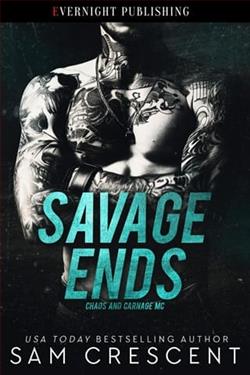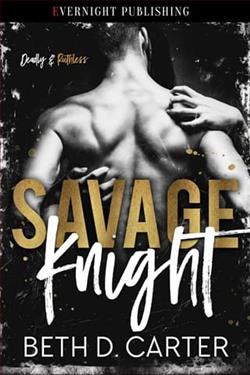Page 94 of The Devil's Canvas
“To a man my father selected,” she says, lips twitching. “He thought quoting Virgil made him interesting.”
Evander chuckles. “He wept when she vanished mid-ceremony.”
“I didn’t vanish. I was claimed. There’s a difference.”
“You tackled a priest and set the carpet on fire.”
I stare at them. “Wait. How old are you?”
Liora lifts her glass. “I was born in 1701.”
“You fell in love before electricity,” I manage, my lashes fluttering like they’re buffering for comprehension.
Julian leans in. “You okay?”
“I’m talking to a woman who predates plumbing and could still headline Paris Fashion Week.”
Liora smiles, warm and wicked. “Immortality doesn’t erase time. It just teaches you how to wear it.”
A knock sounds at the door. Julian and Evander move instantly, stepping in front of me and Liora with predator-smooth reflexes.
“Enter,” Evander calls.
The door creaks open. Theron steps in, calm and composed. Selene follows, her posture effortlessly royal.
“Did you just... knock?” Evander asks, visibly offended.
“Yeah,” Theron says. “Selene told me to.”
“I believe in manners,” Selene replies, flicking lint off her sleeve like she’s preparing for battle. Her gaze lands on me—sharp, curious, amused.
“So,” she says, crossing her arms. “What are we talking about?”
“Our markings,” Liora answers. “Tell them about the night you were marked.”
“That night wasn’t dramatic,” she says. “No altar. No moon. Just a holding cell. Under a church. Salem.”
“Wait—Salem, like the witch trials?”
“1692,” Selene says, her voice all silk and barbed wire. “I was mortal. Educated. Unapologetic. A little too outspoken for men who preferred their women docile and afraid.”
She meets my gaze, eyes cold and daring.
“I stood up for girls they called liars. For women they called witches. I questioned their authority. Challenged their narratives. Corrected their sermons.”
She lets her lip curl, voice dripping with disdain. “They called me dangerous.”
Her smile sharpens—a threat and a promise. “They weren’t wrong.”
“You were one of the accused?”
“I was a woman with opinions and no husband,” she says dryly. “So yes. That was enough.”
“I thought they burned witches.”
“No,” Selene says flatly. “That was Europe. In Massachusetts, they hanged them.”
“Oh.” I wince. “Sorry.”















